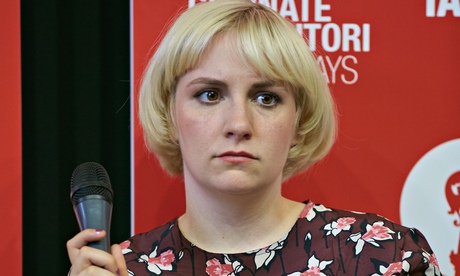
A week or so ago, I went to LA to interview a ridiculously talented young woman. Despite being only in her 20s, she has achieved the kind of success that most people multiple times her age have never achieved. And so, inevitably, book publishers got in touch and, just as inevitably, they suggested she write a memoir.
“But I really wasn’t interested in that,” the 27-year-old told me. “I think you should wait until you have a story to tell, you know?”
Contrary to what you might have expected, the 27-year-old in question was not Lena Dunham. But as it happens, Dunham, who is now the venerable age of 28, is about to publish her first book, Not That Kind of Girl, which consists of, yes, a series of memoir essays.
Ever since her debut feature film, Tiny Furniture, made when she was only 24, and especially since she was gifted at 25 with the HBO series Girls, which she directs, writes and stars in, Dunham has been blasted with the kind of vitriol that in a pre-online world would have been reserved for dictators. Some of these criticisms have merit, but most feel distinctly like a combination of jealousy and impossible expectations of Dunham. Nonetheless, she has dealt with these online critics with the kind of grace that eludes people older and allegedly more rational than her (well, HELLO there, Richard Dawkins!) And through it all, despite the attention, the expectations and criticism, Dunham has continued to make what is, all in all, an excellent TV show.
Dunham is a fantastic and brutally honest writer, and both her film and TV series are heavily based on her life growing up in Brooklyn, but viewed through the more forgiving lens of fiction. Last week, the New York Times ran an interview with Dunham with the headline Lena Dunham Is Not Done Confessing, which sounded, frankly, like a threat. Dunham was paid a much-discussed $3.7m book advance by Random House in the US for her book of autobiographical essays; and, while on the one hand this seems rather extraordinary, on the other it feels absolutely inevitable.
The book publishing world has, for some time now, become wholly memoir-ified. Nothing gets a publisher’s chequebook out faster than a memoir, to the point that nonfiction books that are ostensibly about a specific subject (butchery, say, or George Eliot) are now styled and sold as memoirs (respectively Cleaving: A Story of Marriage, Meat, and Obsession by Julie Powell; and The Road to Middlemarch, by Rebecca Mead.) Everything must be seen through the personal lens, the theory goes, and a personal story gives the reader a narrative to follow, because the disintegration of a woman’s marriage is far more interesting than some boring old butchery. Make the writer a celebrity and the book will sell itself – ta da!
A book is not worth buying, it seems, unless the writer discloses something shockingly personal about herself – and it is, almost invariably, a her. There are certainly men who write in the memoir form: the wonderful David Sedaris, for a start, and more recently the very different but equally brilliant Karl Ove Knausgaard. But in my experience, in both journalism and publishing it is women who are most encouraged to reach inside themselves, pull out their guts and slap them unadulterated on the page.
Dunham defends the rise of the female memoir in the introduction to her book, positing it as a triumph of feminism. But it is a thin line between the long overdue validation of women’s lives and telling women that the most interesting thing they have to offer, and that all they can be trusted to write about, is themselves.
When I was discussing some book ideas with a man who works in publishing, he waved them away and suggested I “knock out a memoir”. I explained that the idea of sharing my not especially eventful life with a load of strangers made me break out in hives, and suggested instead a non-personal idea. He replied my advance would be “five times less than it would for the memoir”. I still declined, and maybe this was cowardice or even selfishness, keeping all those “hilarious” anecdotes from my teenage years to myself. But there are so many interesting things in the world. Why write only about me?
Dunham dedicates the book to her late friend Nora Ephron, who lived by the maxim “everything is copy”. But Ephron didn’t mean by that “absolutely everything in my life is copy” – she meant “everything in the world is copy”. Especially when she was young, she wrote about anything, from feminism to cooking, Nixon to Betty Friedan and, yes, her own life. But she always looked outward, even while looking inward.
Writing well about oneself is a lot harder than many assume, and Dunham did it wonderfully when she fictionalised it in her TV show and film. But a life is not a readymade story, nor interesting in itself, and women have more to offer than the personal. Incidentally, that 27-year-old I interviewed in LA? She ended up writing a book about science. And it’s great.

